Mani Ram Bagri
| Ch. Mani Ram Bagri | |
|---|---|
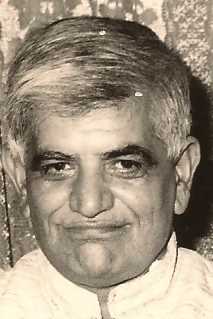 | |
| Member of Legislative Assembly | |
| Constituency | Fatehabad, Haryana |
| Member of Parliament 3rd Lok Sabha | |
| Constituency | Hisar, Haryana |
| Member of Parliament 6th Lok Sabha | |
| Constituency | Mathura, Uttar Pradesh |
| Member of Parliament 7th Lok Sabha | |
| Constituency | Hisar, Haryana |
| Personal details | |
| Born | 1 January 1920 Ban Mandori, Hisar, Haryana |
| Died | 31 January 2012 (aged 92) Hisar, Haryana, India |
| Nationality | Indian |
| Spouse(s) | Dhani Devi |
| Residence | Bagri Chowk, Hisar, Haryana |
| Profession | Activist, Politician |
Mani Ram Bagri (January 1, 1920 – January 31, 2012) (चौधरी मनी राम बागड़ी) was an eminent politician from India. He served three terms in the Indian Parliament. Mr. Bagri is a subject of various folklores in the states of Haryana, Rajasthan, Punjab and Uttar Pradesh. He belonged to the league of Socialists like Dr. Rammanohar Lohia and Jayaprakash Narayan.[1]
Mani Ram Bagri was born at Ban Mandori, Hissar District, Haryana on January 1, 1920. He participated in various national movement at very young age and joined Socialist movement led by Acharya Narendra Deva, Jayaprakash Narayan and Dr Rammanohar Lohia. He was leader of the Socialist parliamentary party during 1962-67, when Dr Rammanohar Lohia entered the Lok Sabha through a by-election from Farukhabad. Mani Ram Bagri participated in and led various socialist movements. A close associate of late Dr Lohia and Raj Narain, he was also detained during Emergency under the Maintenance of Internal Security Act. Mani Ram Bagri was General Secretary of the All India Samyukta Socialist Party (Lohiavadi) during 1972-74, and alter of Janata Party (S).[2]
He represented Hissar and Mathura constituencies in the Indian Parliament.[3] A three time Parliamentarian, he was a member of the 3rd Lok Sabha (2 April 1962 – 3 March 1967) [4] as a Socialist member from Hissar (then part of Punjab state), the 6th Lok Sabha (23 March 1977 – 22 August 1979) as a Janata party member from Mathura (Uttar Pradesh) and the 7th Lok Sabha (10 January 1980 – 31 December 1984) as a Janata (S) member again from Hissar (Haryana).
Having risen from a very poor family, Bagri spent most of his life fighting for the underprivleged sections of the Indian Society.He had joined politics at a young age and devoted his entire life to the poor's rights. He was a hardcore socialist and demanded the word of other Non-Congress parties in the government and this attitude earned him the honour of being the first Leader Of Opposition in the Lok Sabha. Bagri is widely regarded across party lines as having been a politician with impeccable integrity and ethics.He was renowned for living a frugal lifestyle and used to donate a large amount of his salary to the poor around Hissar, Delhi, amongst other such towns.[5] Bagri was held in utmost esteem by successive Prime Ministers of India including Jawaharlal Nehru, Lal Bahadur Shastri, Morarji Desai, Charan Singh, Indira Gandhi, Rajiv Gandhi, Atal Bihari Vajpayee and Manmohan Singh. Despite representing a brand of socialist ideology often opposed to Congress' policies, Bagri shared a deep personal bond with Nehru, Shastri and Indira Gandhi. Bagri played a pivotal role in shaping the nascent democracy in India, and gave voice to millions of villagers, the poor and the downtrodden and represented their aspirations. He led many movements in North India championing the cause of the poor and the oppressed and is considered a major force in giving these weaker sections of society self-belief.
Mr Bagri was an excellent communicator[6] and a brilliant orator. One of Mr. Bagri's famous speeches in Parliament related to nationalization of Birla House which was owned by the Birla family. Government was not very keen on this, Mr. Bagri being his usual fiery self thundered:
"My question is that the way Guru Tegh Bahadur’s place of martyrdom was commemorated in a foreign land, the way Ram, Krishna and other great people’s places of martyrdom was commemorated, then can the Government cite a reason that in their own country the site of martyrdom of the Father of the Nation cannot be commemorated? Actually the Government is sold out to the Birlas" [7] Despite his rivalry between the Congress Leaders, he maintained a cordial relationship with prominent leaders such as Jawaharlal Nehru and Mahatma Gandhi.
He officially retired from politics in the late 1980s as the Indira Gandhi government slowly dissolved.He outlived most of his league-in-arms and spent the rest of his life at his residence in Hissar, and the chowk in which it is located is, till date, known in his honour as Bagri Chowk. Bagri, ailing for the past few years, died in Hissar on January 31, 2012 at the age of 92 years.


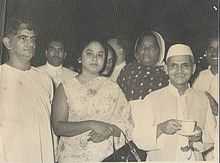
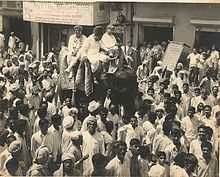
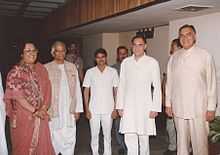
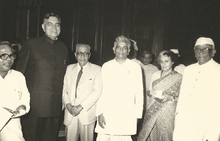
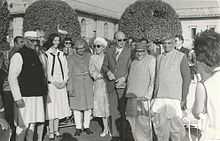
References
- ↑ "tribuneindia... Regional Vignettes". Tribuneindia.com. Retrieved 2012-02-09.
- ↑ "NEWS-Veteran Socialist leader and parliamentarian Mani Ram Bagri, passed away today". The Radical Humanist. Retrieved 2012-02-09.
- ↑ "Biographical Sketch Of Sixth Lok Sabha(State Wise)". Parliamentofindia.nic.in. Retrieved 2012-02-09.
- ↑ "Biographical Sketch Of Third Lok Sabha(State Wise)". Parliamentofindia.nic.in. Retrieved 2012-02-09.
- ↑ "Haryana News Today". Haryana News Today. 2012-01-31. Retrieved 2012-02-09.
- ↑ From Jawaharlal Nehru to Mani Ram Bagri, India has never lacked for great communicators in its politics. http://www.dailypioneer.com/columnists/edit/one-nation-under-the-same-satellite-feed.html
- ↑ http://www.epw.in/system/files/pdf/2012_47/30/A_Nation_Set_in_Stone.pdf
- http://www.theradicalhumanist.com/index.php?option=com_radical&controller=news&Itemid=54&cid=478&task=single
- http://www.haryananewstoday.com/managenewssingle.aspx?id=271
- http://www.tribuneindia.com/2012/20120201/haryana.htm#3
- http://dainiktribuneonline.com/2012/02/%E0%A4%86%E0%A4%AE-%E0%A4%86%E0%A4%A6%E0%A4%AE%E0%A5%80-%E0%A4%95%E0%A5%80-%E0%A4%86%E0%A4%B5%E0%A4%BE%E0%A4%9C-%E0%A4%89%E0%A4%A0%E0%A4%BE%E0%A4%A4%E0%A5%87-%E0%A4%A5%E0%A5%87-%E0%A4%AC%E0%A4%BE/
- http://www.lohiavani.com/GalleryPhoto.aspx
- http://164.100.47.132/LssNew/biodata_1_12/1428.htm